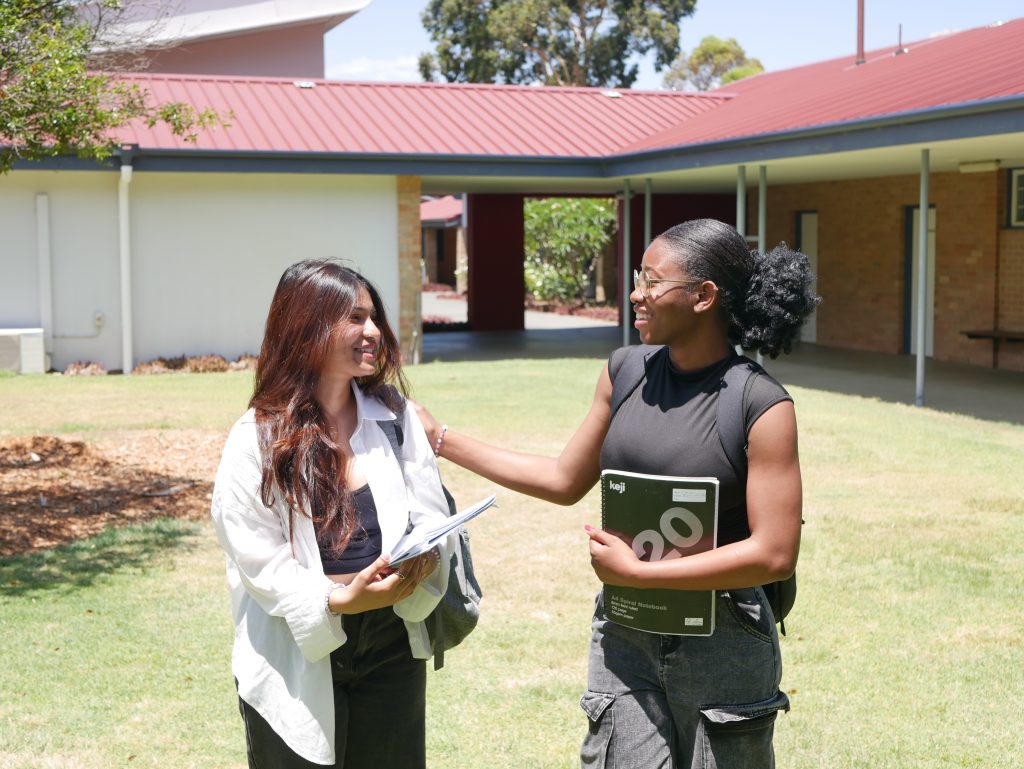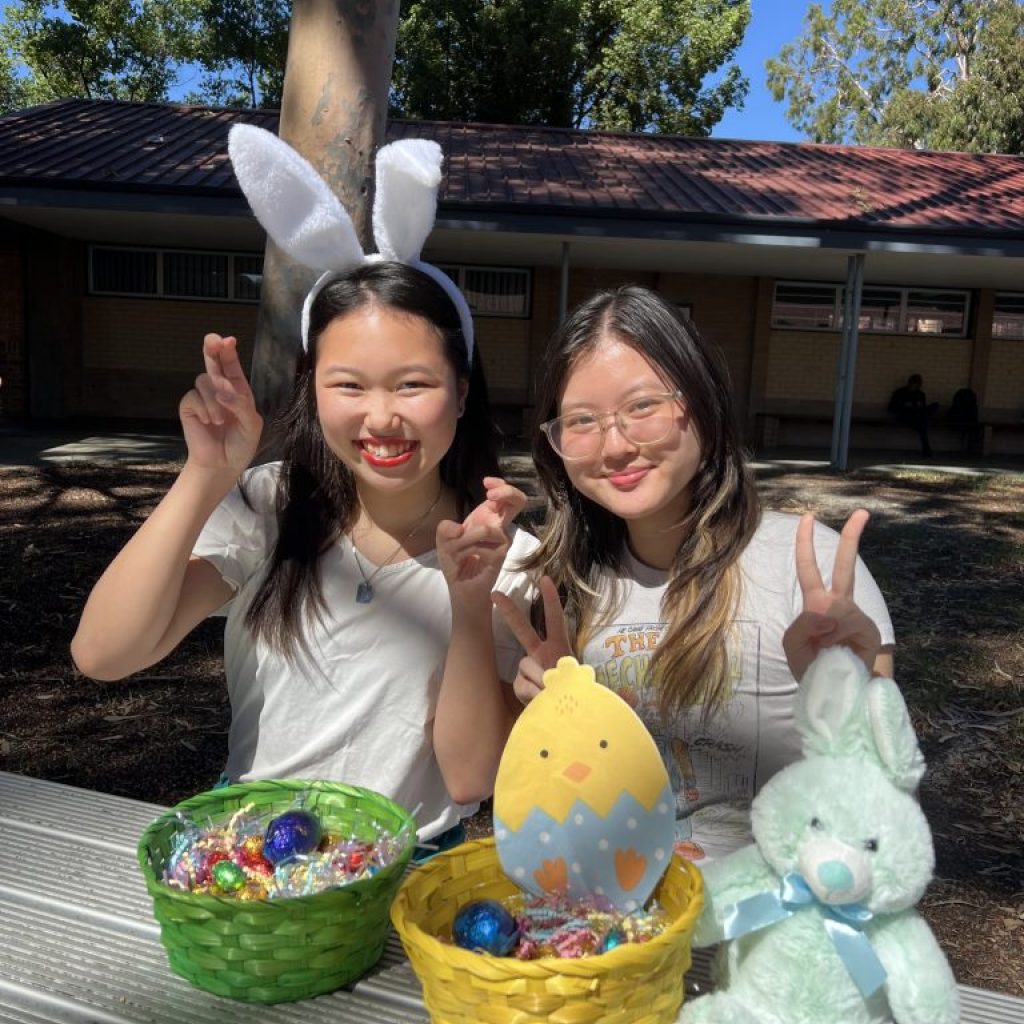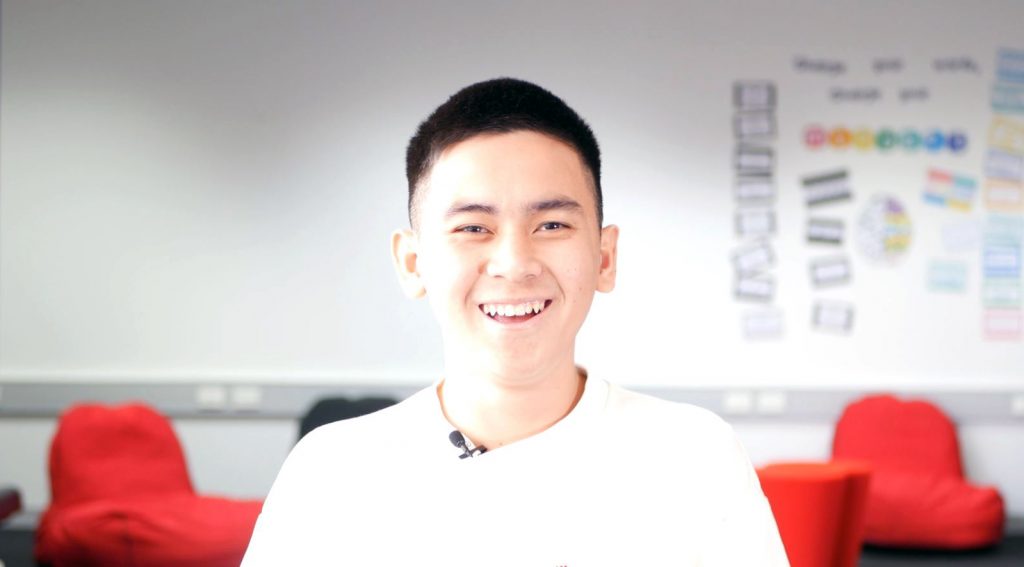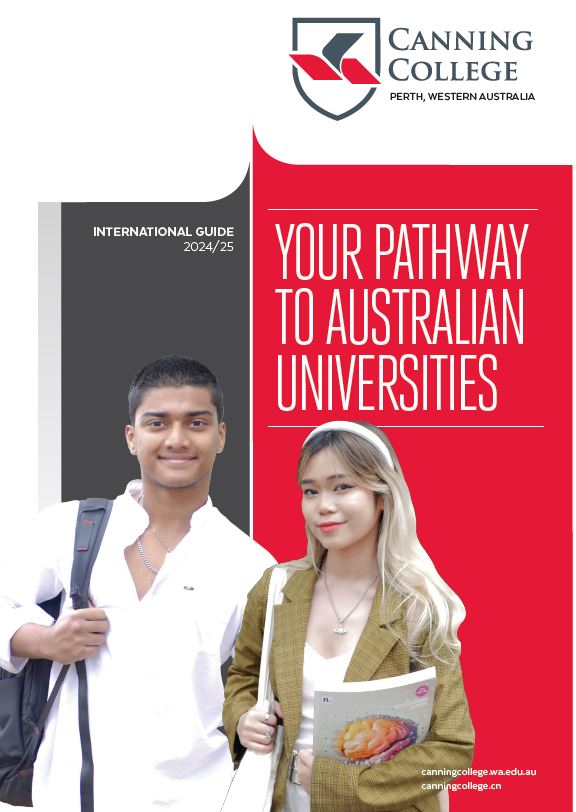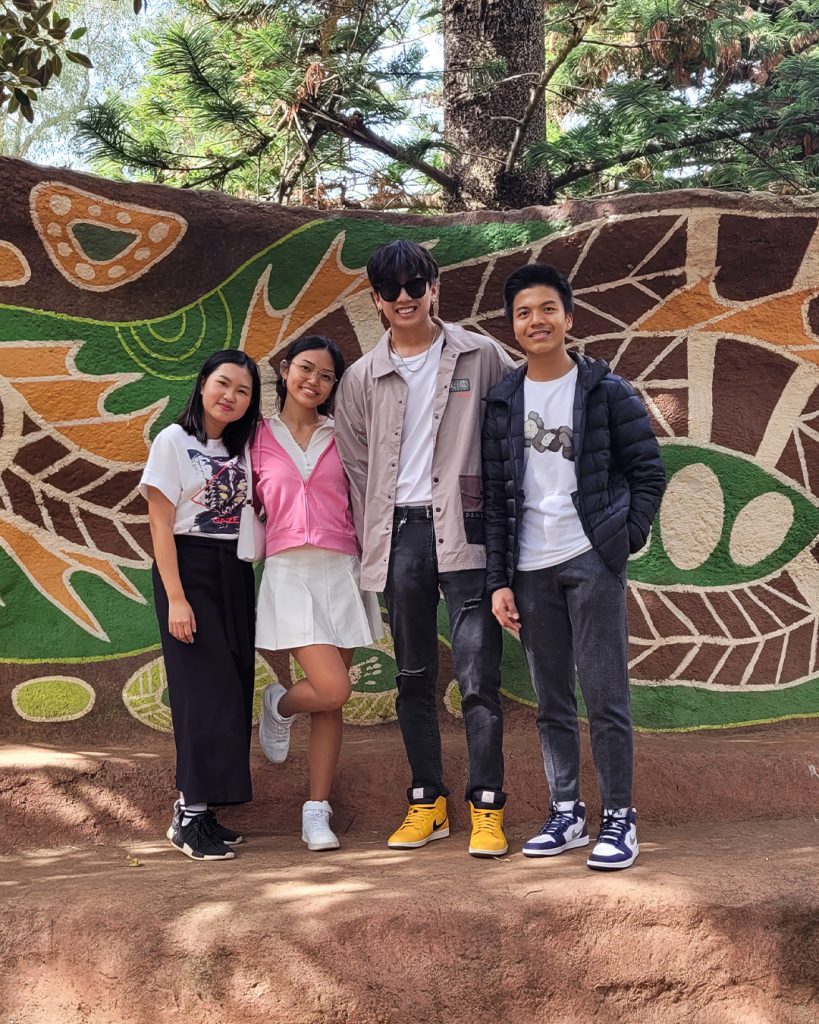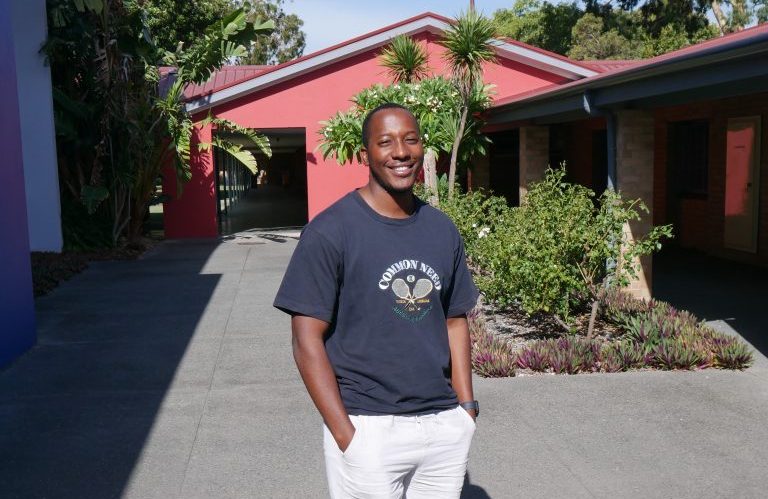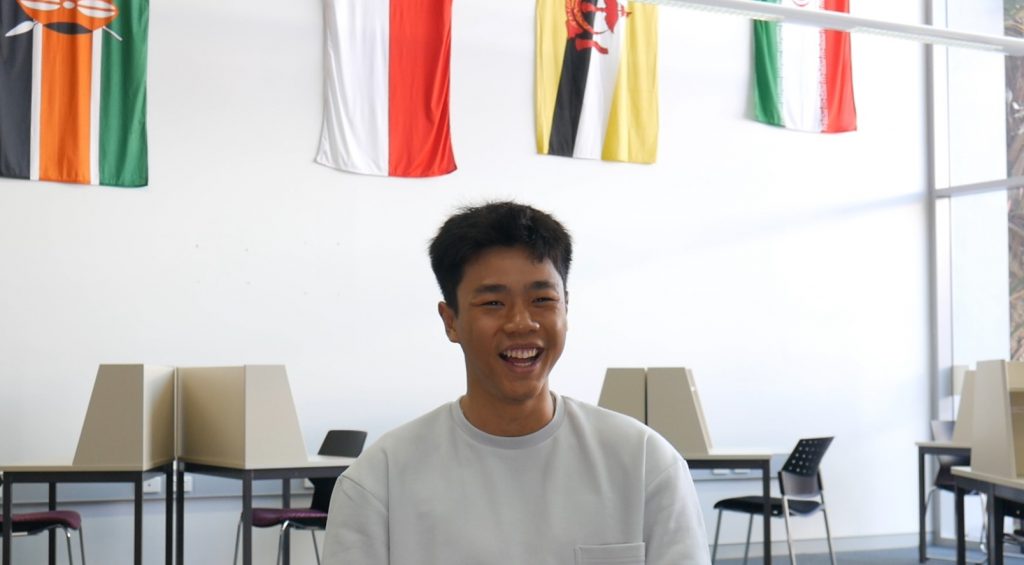Local/domestic students can get more from WACE at Canning College. This is the perfect study environment for students who want to work towards achieving WACE ATAR (WA Certificate of Education Australian Tertiary Admission Rank) in a university-style environment.
Continue readingTerm 1 Image Gallery 2024
Reflecting on Canning College’s Term 1 in 2024. Our cameras captured students engaged in their studies and during many activities over the course of the term.
Continue readingHao’s journey to Canning College
Hao's journey to canning college
Hao, who is from Vietnam, studied the WA Universities Foundation Program (WAUFP) as a pathway into the University of Western Australia.
Canning College provided advice, guidance and support during his WAUFP studies as he adjusted to a new way of learning and living.
Watch the video below to find out more about Hao’s journey to Canning College.
International Guide ready to download
International Guide: All you need to know
Canning College’s 2024-25 International Guide is ready to read online. It has everything international students need to know about our pathway-to-university programs, how to apply and why studying in Perth is a great choice.
This comprehensive 44-page International Guide provides detailed information to help prospective students – and their parents – choose the right Canning College program to take international students on their pathway to university.
Our programs have helped thousands of international students enter Australia’s best universities – including the five institutions here in Perth, Western Australia.
Check out the International Guide to find out more about our connections to Western Australia’s excellent universities, testimonials from former students and how we provide the care, support and attention to make it easier for students to succeed at university.
And, if you’re a current or former student and you took part in one of our official photoshoots over the years, you might even see yourself in the pages of the International Guide.
If you, or someone you know, is interested in becoming an international student at Canning College, check out the International Guide or send us an email at caninng.col.info@education.wa.edu.au
A bright future for graduates
A bright future awaits
A bright future awaits Canning College’s latest graduates, who recently celebrated the completion of their course of study.
At a Presentation Evening function held at The Hub, we recognised the achievements of almost 120 students from 20 countries, who studied the WA Universities’ Foundation Program, Diploma of Commerce and Certificate IV in University Access Program with us.
We are grateful to the Minister for International Education, the Hon. Mr Templeman, MLA, who was a special guest speaker at the event.
The Minister spoke of the important role Canning College plays in helping international students adjust to life in Western Australia and tackle their academic studies with confidence and optimism.
In a humorous and entertaining speech, he also praised the students, valedictorians, performers and award winners.
We heard wonderful valedictory speeches from Nyan Lin and Pauline and witnessed incredible performances from Shem and Alex.
We applauded the efforts of top WA Universities’ Foundation Program student Tan Yuze, who won the Doug Russell Award. His fellow Singaporean, Archana, was awarded the Principal’s Commendation.
Congratulations were also reserved for top Diploma of Commerce student Jeannie, who won the Ron Goddard Award, and Chang Shi Hui and Pham Ngoc Phong Trinh, who shared the Canning College Advisory Board award as equal best Certificate IV in University Access Program students.
Our students were also privileged to hear from Curtin University’s Hannah Wilkinson, and Dr Fang Liu from The University of Western Australia.
Thank you to all our special guests for joining us on the night.
We also extend our appreciation to all students for contributing so richly to Canning College. We wish them well and hope they will all have a bright future.
Award winners
WA UNIVERSITIES’ FOUNDATION PROGRAM
Doug Russell Award (Dux) – Tan Yuze (Singapore)
Principal’s Commendation – Archana Gopakumar (Singapore)
Subject awards
Accounting and Finance – Silvia Cendana (Pekanbaru, Indonesia)
Business Management and Enterprise – Amberlyn Yeo (Bintulu, Malaysia)
Chemistry – Tan Yuze (Singapore)
Computer Science – Issac Chang (Penampang, Malaysia)
Economics – Archana Gopakumar (Singapore)
English Language and Australian Cultural Studies – Yong Wen Quan (Johor, Malaysia)
Human Biology – Tan Yuze (Singapore)
Mathematics Applications – Tan Yuze (Singapore)
Mathematics Methods – Isaac Chang (Penampang, Malaysia)
Physics – Isaac Chang (Penampang, Malaysia)
Psychology – Angela Kiu (Bintulu, Malaysia)
DIPLOMA OF COMMERCE
Ron Goddard Award – Jeannie Kong (Kota Kinabalu, Malaysia)
CERTIFICATE IV IN UNIVERSITY ACCESS PROGRAM
Canning College Advisory Board Award – Chang Shi Hui (Miri, Malaysia)
Canning College Advisory Board Award – Pham Ngoc Phuong Trinh (Ho Chi Minh City, Vietnam)

What Is WACE and Why Does It Matter? A Guide for Students
The completion of the Western Australian Certificate of Education (WACE) is a significant milestone for students in Western Australia as it marks the successful completion of senior secondary education. Although this is typically achieved over Year 11 and Year 12, it can be completed by mature-age students at any time.
Attaining WACE opens the door for future study opportunities and shapes a student’s academic and career trajectory, especially for those seeking an ATAR pathway.
A Comprehensive Introduction to WACE
Governing Bodies
Having a WACE is a sign that you’ve completed the academic requirements for Years 11 and 12. Rooted in the educational framework of Western Australia, WACE is administered by the School Curriculum and Standards Authority. The School Curriculum and Standards Authority meticulously oversees WACE activities, ensuring they align with the educational aspirations and standards in WA.
WACE vs. Other Secondary School Certifications
WACE’s unique structure and comprehensive curriculum set it apart from other secondary school certifications, offering a well-rounded educational experience. When compared with global certifications, WACE’s emphasis on holistic development and diverse subject choices underscore its distinctiveness.
How to Achieve a WACE Certificate
To achieve WACE, students must meet various requirements. These include completing several Year 11 and Year 12 courses and demonstrating a minimum standard of literacy and numeracy.
Where WACE Can Take You
WACE results are used by universities, vocational training organisations, and employers to assess the suitability of candidates for further study or employment. The Australian Tertiary Admission Rank (ATAR) can also be calculated based on the student’s performance in WACE exams, which helps determine eligibility for university entrance.
How WACE and ATAR are Linked
There are two main types of WACE courses: ATAR and General Courses. You do not need to do ATAR to receive a WACE, but you do need to complete WACE to achieve an ATAR.
An ATAR score ranges from 99.95 to zero and is used to position you relative to all other students in WA who sit WACE exams in the same year. For example, if you have an ATAR of 75.00, it means that you have achieved as well as or better than 75% of the students who completed ATAR that year.
ATAR as a Prerequisite for University
University courses have an ATAR score prerequisite. For example, to study a Bachelor of Engineering at Curtin University, you’ll need an ATAR of 80 or higher. A Bachelor of Commerce at the same university requires an ATAR of 70 or higher.
If you don’t reach the ATAR score you need for the university course you want, don’t worry! There are other pathways you can use to eventually study that course (but we won’t go into that today).
WACE for Vocational Pathways
WACE also opens doors to various Vocational Education and Training (VET) courses, offering alternative career paths and opportunities. The VET you undertake while completing WACE can provide direct entry to employment or open doors to future study, including further vocational or higher education.
The WACE Structure
Overview of Subjects and Courses
In a sense, there are multiple ways to achieve your certificate. Rather than fixed subjects, WACE encompasses a spectrum of subjects and courses, which students can choose from. Many balance academic goals and university prerequisites with personal interests, fostering the development of essential skills and knowledge.
Learning areas to choose from at Canning College including English, health, mathematics, science, and technologies.
Assessment and Examination Structure
Assessment under WACE is multifaceted. For each subject, students have a variety of assessments throughout the year (e.g. exams, assignments, practical tasks etc.) and an external exam/s or at the end of the year. Depending on the subject, a student may have a written (or theory) exam, as well as a practical exam. All these elements are used to calculate an individual’s ATAR.
Choosing Subjects and Courses
Embarking on the WACE journey requires strategic planning and informed decision-making, aligning subject choices with career aspirations and passions. For starters, students must choose the right subjects — of course, there are no “correct” subjects in the broader scheme of things. “Right” just refers to subjects that align with academic requirements — we focus on STEM subjects at Canning College.
As a result, the correct blend of WACE subjects and courses will be different for each person. Some students find this process overwhelming, which is perfectly normal and okay. Our Student Services team can assist you in choosing the best subjects for your interests and future study needs.
Four Common Challenges WACE Students Face
WACE students encounter various challenges, recognising these early in the academic journey and adopting proactive strategies are keys to success.
1. Poor Time Management
You won’t be able to master your subjects solely by the work that you do in class, even if this is what you’ve done in the past. You’ll need to put in additional time for study, practice and revision at home, especially around exam time. However, between work, family, hobbies, and social commitments, some students struggle with time management when it comes to studies.
2. Unaware of Syllabus and Study Requirements
While it’s true that the syllabus can be hard to understand, reading it is essential so you know what’s required of you. You can read the WA syllabus here.
3. Not Enough Emphasis on Assessments
When it comes to ATAR, too many students mistakenly believe everything depends on the end-of-year exams. Remember, 50% of your ATAR comes from the marks you achieve throughout the year (assignments and assessments) and 50% of the end-of-year exam marks.
4. Cramming for Exams
Adding another dimension to poor time management, “cramming” occurs when students cruise through the year and then intensively study large volumes of information in a very short period of time, right before exams. The technique focuses on rote memorisation rather than a deep understanding of the material and often results in a lack of sleep, which ironically impairs memory. Exam cramming is famously ineffective, yet it’s a common situation students find themselves in.
Study Tips and Resources for WACE
Study Habits and Routines
Establishing disciplined study habits and routines early on in the year is fundamental for academic achievement. It also helps you maintain a healthy balance between all commitments — work, hobbies, family, and friends. It’s a good idea to regularly review your commitments and prioritise accordingly.
Utilising Resources and Seeking Help When Needed
Using available resources and seeking help proactively can significantly enhance understanding and retention of knowledge. At Canning College, teachers are always willing to provide out-of-class additional support as required. Teachers are also rostered into our learning centre-for ‘free tuition’ at advertised times.
Managing Stress and Exam Anxiety
Learning to manage stress and anxiety can significantly improve assessment experiences and outcomes. A key way to mitigate and manage stress is making time for hobbies, relaxation, journaling, meditation, sleep and social engagements. A balanced diet and exercise — even if light or minimal — are also key.
Six Specific Study & Revision Techniques for WACE
Adopting effective study and revision techniques significantly improves learning speed and information retention.
Below are some proven and popular study methods. You’ll naturally gravitate to specific ones and combinations, or blend techniques, depending on your learning style. For example, you might use the Pomodoro Technique (5) to do Mind Mapping (3) and then finish up with a Summary Sheet (6).
1. Active Recall
Retrieve information from your memory without looking at the text. Answer questions, do practice problems, or explain concepts out loud. This strengthens memory recall and identifies areas of weakness.
2. Spaced Repetition
Review the same material multiple times over increasing intervals. This helps combat the “forgetting curve” (a hypothesis that suggests that over time, the memory of learned information decays if it’s not reviewed or used) and strengthens long-term retention.
3. Mind Mapping
For visual learners, mind mapping is a great practical tool — simply draw or create visual diagrams that represent relationships between concepts. This enhances memory through visual cues and the organisation of information. When it’s time to recall this information, you’ll picture the diagram in your head instead of words on a page.
4. Self or Assisted Quizzing
Regularly test yourself with flashcards or mock quizzes. If possible, have someone else write the quiz or hold up flashcards for you. This reinforces memory, identifies gaps in knowledge, and mimics test conditions.
5. The Pomodoro Technique
Work 25 minutes then take a five-minute break. Repeat. Each study session is called a “Pomodoro” — when you complete four, increase the break intervals to 15 minutes. This prevents burnout and helps you maintain high levels of focus.
6. Write a Summary Sheet
Condense your notes and material into one-page summaries for each topic. Even if you study the same material multiple days in a row, you should write a new Summary Sheet each time. This simplifies revision, identifies key points, and aids visual learning.
Your WACE Journey Starts at Canning College
Looking to begin your academic WACE journey? You can register your interest in attending Canning College on this page or call us on 9278 3500 to arrange a discussion. Canning College will contact you to arrange a meeting to discuss your interest in the College and your future plans.
The Future for Domestic Students Begins at Canning College
Education is always evolving, and Canning College is excited to resume the enrolment of local students.
Of course, the College will continue to serve international students alongside the domestic intake. In seeking to be a cornerstone for local and international students charting their journey to higher education, Canning College presents a blend of rigorous academic training, real-world exposure, and a network of support.
By fostering an environment of growth, curiosity and ambition, a path to future success starts at Canning College.
The Local Students Canning College Caters For
Canning College is open to selected local students in Year 10, Year 11, Year 12, and, in some cases, those seeking to study the WA Universities’ Foundation Program. Some mature age students may also enrol in Canning College courses.
Canning College students come from more than 20 countries and a strong and vibrant international culture is built into campus life. A multicultural campus provides an environment for young adults to interact and make friends with peers from around the world, to develop cross-cultural understandings and a deeper appreciation of global society. Canning College’s robust curriculum and supportive environment ensure that every student, regardless of where they stand in their senior secondary academic journey, finds the resources and guidance they need to excel.
For Year 10s, 11s and 12s.
Students can complete their senior secondary schooling at Canning College and seamlessly transition into university. Canning College’s unique Year 10 program provides a platform that puts students on track for Year 11 and Year 12 ATAR studies, and the completion of the WA Certificate of Education (WACE).
The Year 10 program comprises the mandated learning areas of Western Australian Curriculum for Year 10: Mathematics, English, Science, and Humanities and Social Sciences (“MESH” subjects) and Health and Physical Education, enhanced with excursions, workshops and hands-on learning experiences. These expanded learning opportunities prepare students for Year 11 ATAR, serve to motivate and guide students to achieve their ambitions, and support their growth as informed, caring and capable local and global citizens.
When you complete high school studies at Canning College, you get to enjoy a university-style campus and routine. No school uniforms, no sirens or bells to mark recess and lunch — it’s a more mature environment that students love. It’s worth noting that, due to the range of our programs, timetable structure and the physical openness of the campus, students need to be self-managing and self-responsible.
More on University Pathway Programs at Canning College.
Canning College’s goal is to inspire students to achieve their ambition of university entry.
Our approach? We offer tailored programs that facilitate a seamless and successful transition to universities. But that’s not all. We equip students with the skills, knowledge, and resources to thrive. With established resources and support systems, students enhance their academic preparedness, gearing up for the best that higher education has to offer.
Why Domestic Students Choose Canning College for University Pathways.
The proof is in the pudding — or in this case, the success stories. Canning College’s international graduates regularly transition into top universities and enrol in sought-after degree programs. But why should local students specifically be interested in Canning College’s pathway options?
Beyond the academic programs, Canning College offers an environment that nurtures growth, curiosity, and ambition. Students aren’t just prepared for university — our staff, programs, resources, and facilities, prepare them for life.
Studying at Canning College is not just about acquiring bookish knowledge. It blends academia, practical skills, and social opportunities to increase student capabilities. Moreover, by fostering collaboration with university faculties, Canning College ensures course alignment and readiness for what lies ahead. Students experience similar challenges to those they’ll face in future academic pursuits and everyday work environments.
The College hosts numerous workshops and seminars in conjunction with university partners, further bolstering students’ readiness for the next phase of their academic journey.
By providing continued support, guidance, and resources, we ensure our students don’t just survive in universities — they thrive.
Take the Next Step in Your Domestic Studies with Canning College.
Register your interest here or call us on 9278 3500 for more information. At this stage, Canning College is gauging interest in the subjects that will be offered. On receipt of your Registration of Interest form, Canning College will contact you to arrange a meeting to discuss your interest in the College and your future plans.
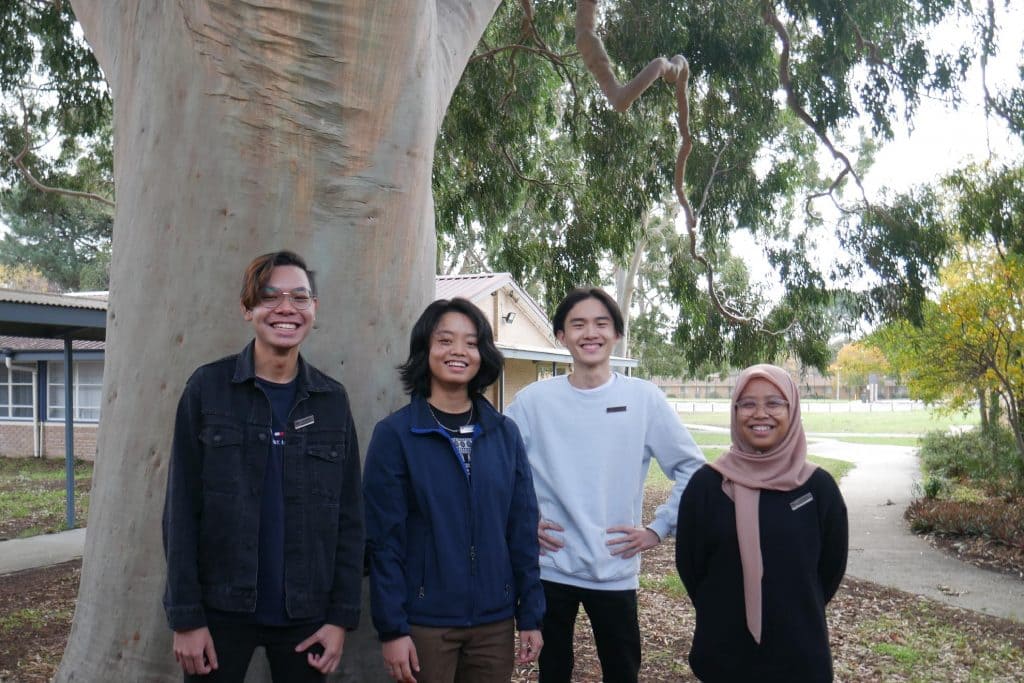
Inspiring girls at careers forum
Industry function inspiring girls
Five of Canning College’s most inquisitive young students enjoyed an exciting day out as attendees at the Inspiring Girls Careers Forum.
Silvia, who is from Indonesia, Pauline (Philippines), Archana (Singapore), Jeanne (Hong Kong) and Claudia (Singapore) represented the College at the Optus Stadium event, which involved around 200 Year 10, Year 11 and Year 12 students.
Sponsored by the Chamber of Minerals and Energy WA, the event also involved around 80 representatives of 26 resources companies.
Passing the torch to us
The students spoke to company representatives about specific opportunities within the industry.
Pauline, who is also a Student Ambassador, said it was great to be involved in the Inspiring Girls event that was focused on the women in the mining industry.
“It was refreshing to have been involved in an event that was led by women,” Pauline said. “The thing that hooked me was that they made a point of saying the future is about young people. People in the industry know that lowering carbon emissions to net zero can only be done by inspiring the next generation and passing the torch to us. It was inspiring to see so many women talking so passionately about what they do.”
Students were also involved in an authentic problem-solving task to select, build and run a gold mining site in a profitable way. Industry representatives helped guide the students through the process, which involved using tokens to purchase information to help inform their decision making.
Using money wisely
Chemistry teacher Patricia said the students were focused and engaged throughout the day.
“They selected their mine site based on geological maps that showed fault lines, gravitational variation, magnetic variation, core sample results, as well as indigenous sacred sites and ecological concern sites,” Patricia said.
“They used their money wisely to hire local workers, equipment and earn environmental credit points. They also had to convince investors to invest in their project. It was a very challenging activity that the girls really enjoyed.
“It taught them about the complexity of real-world situations and the wide range of factors considered by the mining industry. They also learned about working with limited resources, which helped them develop problem solving skills.”
Trade booth visits
The girls visited trade booths and talked to representatives about what each company did and the programs they offered. They had a great opportunity to network and find out about a wide range of job opportunities in Australia as well as internationally.
“The industry representatives they spoke with were impressed with their analytical skills and convincing arguments when seeking investors and hiring local workers,” Patricia said.
“The girls asked great questions and the representatives were very informative. It gave the girls a lot to think about and helped them connect with industry professionals about job opportunities.”
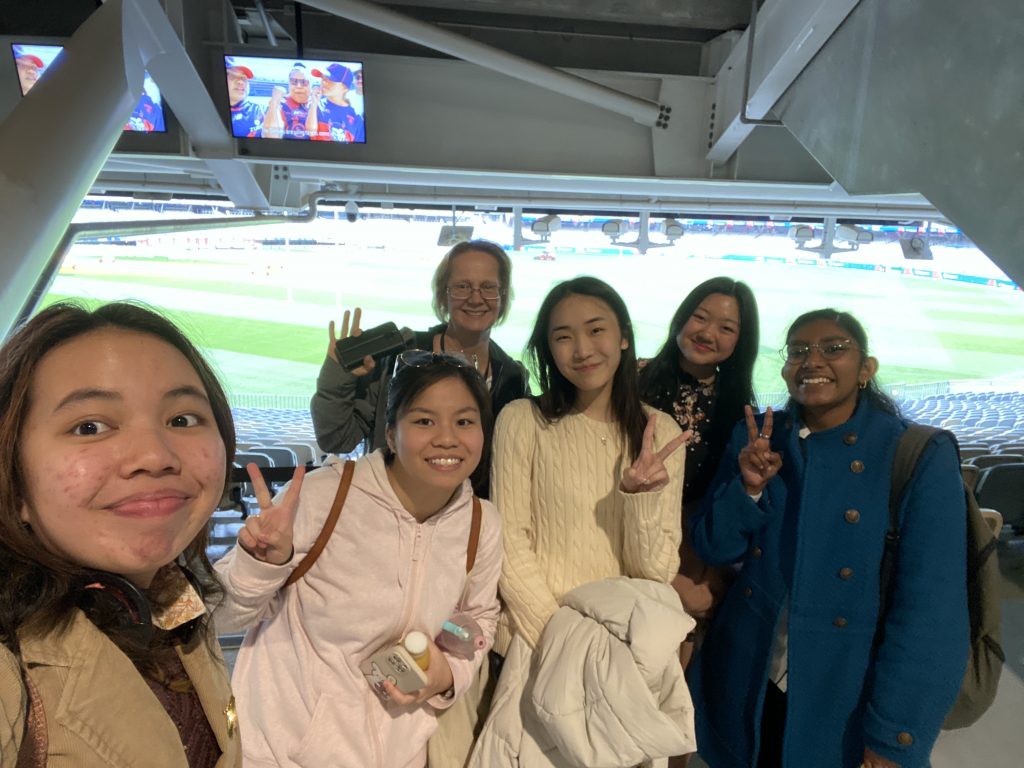
Kelvin’s success in Australia
How Kelvin had success in Australia through Canning College
It would have been easy for Kelvin Nayaho to have been unsettled by his first experience in Perth, Western Australia.
Instead, then a teenager, he pushed on, earned entry into university and became a physiotherapist. Then he moved to Victoria before returning to Perth to consider chasing his dream – medicine. Late last year, he also became a permanent resident of Australia.
And all this in just eight years.
A citizen of Burundi, Kelvin was born in Tanzania, East Africa, and travelled to Zambia after his family was accepted as refugees. When he moved to Perth to join the WA Universities’ Foundation Program at Canning College in 2015, it was with the intention of becoming a doctor.
Working for Australia’s biggest mining company
Although he is currently working as a fly-in-fly-out physiotherapist for Australia’s biggest mining company, BHP, he is considering a return to studies in medicine.
“I decided this year to step away from physio and try to pursue a pathway to medicine,” he said on a recent visit to Canning College. “That’s why I’m up in the mines. I’m able to work seven days and try to save as much as I can. And then I have seven days to prepare, study and try to get in (to medicine).”
Getting a year ahead with Canning
While Canning has provided thousands of international students with opportunities to directly enter Australia’s best universities, the College doesn’t only focus on academic learning. It also provides high levels of care and support to help students settle into life in Australia, which improves their chances of success at university.
“Having a year here at Canning College before going to uni made me a lot comfortable with being in Australia,” he said. “Also, it helped me to make friends easier. Looking at the international students who came straight from their home country into university, they found it harder to adjust in their first year. I felt like I was a year ahead and I was a lot more prepared and composed.”
A surprising start to life in Perth
Back in 2015, even before Kelvin got to meet the teachers who would help him along his academic pathway, he first got to know some of the Student Services team. Landing in Perth two days earlier than planned, he had not been expected at his accommodation and needed immediate help.
“I was 17 or 18 years old at the time, so it was a really big thing,” he said. “I was thinking ‘do they even know that I am here? Am I meant to be here? It was an overwhelming feeling but the staff at Canning College handled everything for me.”
Studying at Canning was different to what he had been used to in Zambia, from the style of teaching, the interaction with staff and the conversations with fellow students, who were from many parts of the world.
“In the first year of uni, everyone talked about high school and how bad their Year 12 experience was and how much pressure and expectation there was. That was a different picture to what I had,” he said.
“Canning College is different. It was the best year in my life, in a sense of how much fun I had with learning. Canning College made us see that teaching works both ways, that we had to do something and be proactive.
“The teachers will ask why do you think that? Just to get us to be participants of learning, which I think made it a lot easier going to uni.”
Moving from physiotherapy to medicine
While studying the WA Universities’ Foundation Program with the intention of going into medicine, Kelvin became aware of the physiotherapy degree at Curtin University. He was a good student and he had the scores to pursue either of the popular degrees.
“I took the ISAT test for medicine. My ATAR (Australian Tertiary Admission Rank) score was pretty good, everything was looking like I was going to get it,” he said.
“But it was just that it cost too much. At the time, 2015, we had a bit of unrest back home and the College actually helped me with a scholarship for my second half of semester to finish my study. I’m really grateful for that because if I didn’t finish, I wouldn’t be here.”
His decision to choose a physiotherapy degree at Curtin University was confirmed during a University Information Day at Canning College. Representatives of The University of Western Australia, Murdoch University, the University of Notre Dame Australia, Edith Cowan University and Curtin visit the College regularly to provide information about courses, scholarships and the campus experience.
“It was on the last day to submit my university preferences and I decided to put physio as my number one,” he said.
Experiencing work after study
Since then, Kelvin has completed his degree and experienced life in the workforce. He travelled to Victoria and worked in a hospital during COVID before returning to Western Australia and working in a private physiotherapy practice in Bunbury, which is about 90 minutes south of Perth.
He moved back to Perth to take up a sports physiotherapy position and was involved in a local rugby club. After receiving his permanent residency last year, he started to think again about his dream of becoming a doctor. Whatever happens next, Kelvin will always be grateful for his Canning College experience.

Great reasons to study in Perth
Great reasons to study in Perth
There are many great reasons to study in Perth. Canning College is one of them.
Canning College provided Indonesian student Fayadh with his first experience of Western Australia.
Video subtitle indonesia di bawah ini.
Fayadh has made the most of almost every day since moving from Indonesia to study at Canning College. He studied hard at Canning College to earn a place at Curtin University.
As he had chosen to live at the Vickery House accommodation, which is located next to Canning College, he did not have to move his belongings to another place when he started his Bachelor of Commerce degree.
Canning College is next to Curtin University, where Fayadh found work as a barista and cashier in the university library café.
One of the other great reasons to study in Perth was the work experience opportunities that Fayadh made the most of.
Care and support to help students succeed
When Fayadh joined Canning College, he was following in the footsteps of thousands of international students. The College first welcomed overseas students in 1982 and has since established a reputation for providing students with opportunities to achieve academic and personal goals.
A team of teachers and support staff make sure international students can quickly overcome any concerns or anxieties that are not uncommon in people who find themselves in a new country for the first time.
Student Advisors and a dedicated Student Services help students adjust to life in Perth. This makes it easier for them to perform in the classroom.
Setting the right foundation
The WA Universities’ Foundation Program gave Fayadh the academic grounding to enter Curtin University and tackle his Diploma of Commerce with confidence.
The Western Australian Universities’ Foundation Program also provides access to The University of Western Australia, Murdoch University, Edith Cowan University and the University of Notre Dame Australia, as well as other Australian universities such as the University of Melbourne, Monash University and the University of Sydney.
Flexible start times
Fayadh entered the Western Australian Universities’ Foundation Program at Canning College in April 2019. He had already completed some comparable Year 11 subjects as part of the Uni-bridge Program at the Darma Yudha school in Pekanbaru, Indonesia.
The Western Australian Universities’ Foundation Program starts in January but students can also join the program in April. This is suitable to stronger students, who have additional classroom time to catch up with the work done by those students who started in January.
There is also a Mid-Year entry for the Western Australian Universities’ Foundation Program. Students who start this program, complete in the middle of the following year.
Teaching and learning
The WA Universities’ Foundation Program is designed to suit international students. In recognition of the different cultural backgrounds of enrolled students, there is particular emphasis on English language teaching.
While most subjects are taught for 4.5 hours per week, the compulsory English Language and Australian Cultural Studies subject is delivered over 9 hours per week.
For information on subjects and prerequisites, CLICK HERE.
Certification gained
The Western Australian Universities’ Foundation Program Certificate is issued by the Tertiary Admissions Service Centre. Students who complete the Western Australian Universities’ Foundation Program receive a Combined Percentage Score, which can be directly compared to the Australian Tertiary Admission Rank. The ATAR is a ranking system that determines university entry for students across Australia.
Enrolling at Canning College
Many students choose to engage an authorised international education agent to assist them with their application to enrol at Canning College. Education agents can also help with other administrative tasks such as visa applications. A list of Canning College education agents is provided on our website here.
Students can also contact Canning College directly and apply to join us by following the procedures outlined on our website here.
WA Universities’ Foundation Program CRICOS Course Code 076495K

